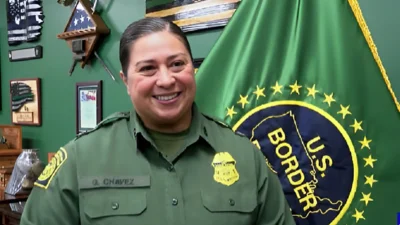The Congressional Record is a unique source of public documentation. It started in 1873, documenting nearly all the major and minor policies being discussed and debated.
“TRIBAL FOREST PROTECTION ACT OF 2004” mentioning the Department of Interior was published in the House of Representatives section on pages H4612-H4613 on June 21, 2004.
The publication is reproduced in full below:
TRIBAL FOREST PROTECTION ACT OF 2004
Mr. GIBBONS. Mr. Speaker, I move to suspend the rules and pass the bill (H.R. 3846) to authorize the Secretary of Agriculture and the Secretary of the Interior to enter into an agreement or contract with Indian Tribes meeting certain criteria to carry out projects to protect Indian forest land, as amended.
The Clerk read as follows:
H.R. 3846
Be it enacted by the Senate and House of Representatives of the United States of America in Congress assembled,
SECTION 1. SHORT TITLE.
This Act may be cited as the ``Tribal Forest Protection Act of 2004''.
SEC. 2. TRIBAL FOREST ASSETS PROTECTION.
(a) Definitions.--In this section:
(1) Federal land.--The term ``Federal land'' means--
(A) land of the National Forest System (as defined in section 11(a) of the Forest and Rangeland Renewable Resources Planning Act of 1974 (16 U.S.C. 1609(a))) administered by the Secretary of Agriculture, acting through the Chief of the Forest Service; and
(B) public lands (as defined in section 103 of the Federal Land Policy and Management Act of 1976 (43 U.S.C. 1702)), the surface of which is administered by the Secretary of the Interior, acting through the Director of the Bureau of Land Management.
(2) Indian forest land or rangeland.--The term ``Indian forest land or rangeland'' means land that--
(A) is held in trust by, or with a restriction against alienation by, the United States for an Indian tribe or a member of an Indian tribe; and
(B)(i)(I) is Indian forest land (as defined in section 304 of the National Indian Forest Resources Management Act (25 U.S.C. 3103)); or
(II) has a cover of grasses, brush, or any similar vegetation; or
(ii) formerly had a forest cover or vegetative cover that is capable of restoration.
(3) Indian tribe.--The term ``Indian tribe'' has the meaning given the term in section 4 of the Indian Self-Determination and Education Assistance Act (25 U.S.C. 450b).
(4) Secretary.--The term ``Secretary'' means--
(A) the Secretary of Agriculture, with respect to land under the jurisdiction of the Forest Service; and
(B) the Secretary of the Interior, with respect to land under the jurisdiction of the Bureau of Land Management.
(b) Authority to Protect Indian Forest Land or Rangeland.--
(1) In general.--Not later than 120 days after the date on which an Indian tribe submits to the Secretary a request to enter into an agreement or contract to carry out a project to protect Indian forest land or rangeland (including a project to restore Federal land that borders on or is adjacent to Indian forest land or rangeland) that meets the criteria described in subsection (c), the Secretary may issue public notice of initiation of any necessary environmental review or of the potential of entering into an agreement or contract with the Indian tribe pursuant to section 347 of the Department of the Interior and Related Agencies Appropriations Act, 1999 (16 U.S.C. 2104 note; Public Law 105-277) (as amended by section 323 of the Department of the Interior and Related Agencies Appropriations Act, 2003 (117 Stat. 275)), or such other authority as appropriate, under which the Indian tribe would carry out activities described in paragraph (3).
(2) Environmental analysis.--Following completion of any necessary environmental analysis, the Secretary may enter into an agreement or contract with the Indian tribe as described in paragraph (1).
(3) Activities.--Under an agreement or contract entered into under paragraph (2), the Indian tribe may carry out activities to achieve land management goals for Federal land that is--
(A) under the jurisdiction of the Secretary; and
(B) bordering or adjacent to the Indian forest land or rangeland under the jurisdiction of the Indian tribe.
(c) Selection Criteria.--The criteria referred to in subsection (b), with respect to an Indian tribe, are whether--
(1) the Indian forest land or rangeland under the jurisdiction of the Indian tribe borders on or is adjacent to land under the jurisdiction of the Forest Service or the Bureau of Land Management;
(2) Forest Service or Bureau of Land Management land bordering on or adjacent to the Indian forest land or rangeland under the jurisdiction of the Indian tribe--
(A) poses a fire, disease, or other threat to--
(i) the Indian forest land or rangeland under the jurisdiction of the Indian tribe; or
(ii) a tribal community; or
(B) is in need of land restoration activities;
(3) the agreement or contracting activities applied for by the Indian tribe are not already covered by a stewardship contract or other instrument that would present a conflict on the subject land; and
(4) the Forest Service or Bureau of Land Management land described in the application of the Indian tribe presents or involves a feature or circumstance unique to that Indian tribe (including treaty rights or biological, archaeological, historical, or cultural circumstances).
(d) Notice of Denial.--If the Secretary denies a tribal request under subsection (b)(1), the Secretary may issue a notice of denial to the Indian tribe, which--
(1) identifies the specific factors that caused, and explains the reasons that support, the denial;
(2) identifies potential courses of action for overcoming specific issues that led to the denial; and
(3) proposes a schedule of consultation with the Indian tribe for the purpose of developing a strategy for protecting the Indian forest land or rangeland of the Indian tribe and interests of the Indian tribe in Federal land.
(e) Proposal Evaluation and Determination Factors.--In entering into an agreement or contract in response to a request of an Indian tribe under subsection (b)(1), the Secretary may--
(1) use a best-value basis; and
(2) give specific consideration to tribally-related factors in the proposal of the Indian tribe, including--
(A) the status of the Indian tribe as an Indian tribe;
(B) the trust status of the Indian forest land or rangeland of the Indian tribe;
(C) the cultural, traditional, and historical affiliation of the Indian tribe with the land subject to the proposal;
(D) the treaty rights or other reserved rights of the Indian tribe relating to the land subject to the proposal;
(E) the indigenous knowledge and skills of members of the Indian tribe;
(F) the features of the landscape of the land subject to the proposal, including watersheds and vegetation types;
(G) the working relationships between the Indian tribe and Federal agencies in coordinating activities affecting the land subject to the proposal; and
(H) the access by members of the Indian tribe to the land subject to the proposal.
(f) No Effect on Existing Authority.--Nothing in this Act--
(1) prohibits, restricts, or otherwise adversely affects the participation of any Indian tribe in stewardship agreements or contracting under the authority of section 347 of the Department of the Interior and Related Agencies Appropriations Act, 1999 (16 U.S.C. 2104 note; Public Law 105-277) (as amended by section 323 of the Department of the Interior and Related Agencies Appropriations Act, 2003 (117 Stat. 275)) or other authority invoked pursuant to this Act; or
(2) invalidates any agreement or contract under that authority.
(g) Report.--Not later than 4 years after the date of enactment of this Act, the Secretary shall submit to Congress a report that describes the Indian tribal requests received and agreements or contracts that have been entered into under this Act.
The SPEAKER pro tempore (Mr. Terry). Pursuant to the rule, the gentleman from Nevada (Mr. Gibbons) and the gentleman from West Virginia (Mr. Rahall) each will control 20 minutes.
The Chair recognizes the gentleman from Nevada (Mr. Gibbons).
General Leave
Mr. GIBBONS. Mr. Speaker, I ask unanimous consent that all Members may have 5 legislative days within which to revise and extend their remarks and include extraneous material on H.R. 3846, as amended.
The SPEAKER pro tempore. Is there objection to the request of the gentleman from Nevada?
There was no objection.
Mr. GIBBONS. Mr. Speaker, I yield myself such time as I may consume.
Mr. Speaker, H.R. 3846 would authorize the Secretary of Agriculture and the Secretary of the Interior to enter into an agreement or contract with Indian tribes meeting certain criteria to carry out projects to protect Indian forest land.
Last summer, reservations were invaded by catastrophic fires from adjacent Federal lands. In southern California, 11 reservations were burned, 2 completely, and a number of lives were tragically lost. After witnessing firsthand the horrible aftermath of these fires, the chairman of the Committee on Resources, the gentleman from California
(Mr. Pombo), promised to develop and move legislation that would help tribes protect their Land.
To follow through with that pledge, and in the spirit of bipartisan Healthy Forest Restoration Act, Senator Feinstein and the gentleman from California (Chairman Pombo) adopted and introduced the Tribal Forestry Protection Act. This legislation will provide a process whereby tribes can engage in projects on adjacent Forest Service and BLM lands to treat excessive fuels and engage in other restoration activities.
By passing this legislation, Congress will be sending a strong and clear message to the agencies that tribes need to be an integral part of the thoughtful management of our Federal lands, for the betterment and safety of all.
Mr. Speaker, I urge the adoption of this bill.
Mr. Speaker, I reserve the balance of my time.
Mr. RAHALL. Mr. Speaker, I yield myself such time as I may consume.
Mr. Speaker, the pending measure has been adequately explained by the gentleman from Nevada. We have no objections to it on our side. In fact, I join in commending the gentleman from California (Chairman Pombo) of the Committee on Resources for his initiative in this matter. We support the legislation.
Mr. Speaker, I yield back the balance of my time.
Mr. GIBBONS. Mr. Speaker, I yield myself such time as I may consume.
I thank my friend the gentleman from West Virginia, Mr. Rahall, for his support on this legislation and urge all Members to support this measure.
Mr. Speaker, I yield back the balance of my time.
The SPEAKER pro tempore. The question is on the motion offered by the gentleman from Nevada (Mr. Gibbons) that the House suspend the rules and pass the bill, H.R. 3846, as amended.
The question was taken; and (two-thirds having voted in favor thereof) the rules were suspended and the bill, as amended, was passed.
A motion to reconsider was laid on the table.
____________________








